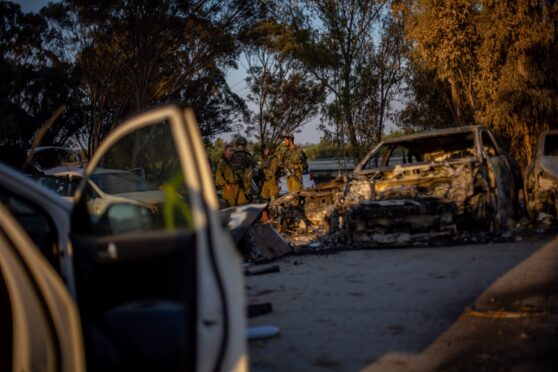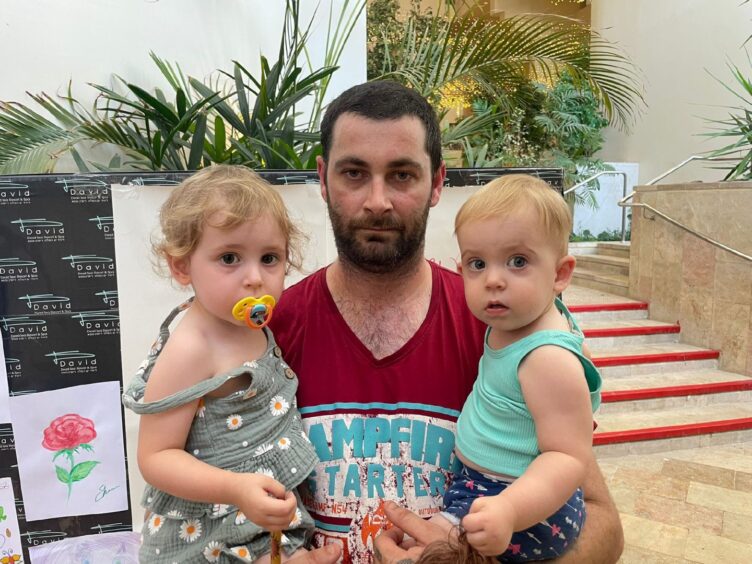
Anthony’s hands shake as he recalls hiding in a bunker for 12 hours with his young family while Hamas militants roamed outside his home on a kibbutz in southern Israel.
Last Saturday, he contemplated what would happen if the gunmen found them.
“The only thing going through my mind was, if they come in here, I’m going to have to kill my kids myself,” he said, his voice breaking.
“I didn’t want my kids to become prisoners, so I thought I was going to have to kill my kids.”
Anthony’s small community on Kibbutz Be’eri has lost a tenth of its population with more than 100 people either kidnapped or killed when Hamas militants broke out of the Gaza Strip before going on a horrifying rampage.
Scattered along the highway in southern Israel are abandoned cars sprayed with bullet holes, the doors still flung open, a reminder of how many people tried to escape. The farmland has been turned into a staging ground as hundreds of thousands of Israeli reservists prepare for a ground invasion of Gaza.
There is no appetite for negotiation or a ceasefire, the anger is palpable. More Israelis have lost their lives in these attacks than in the last two decades of this long-running conflict.
“This was our 9/11,” is a phrase I’ve heard uttered by many Israelis.
On another kibbutz, Ayana Neta said her mother, Adrian, was kidnapped and taken to Gaza. Armed men arrived on motorbikes and forced their way into her home.
“I grew up in a paradise,” she said, “people on the kibbutz didn’t even lock their doors…it’s now hell.”
But despite the risks to her mother, Ayana wanted the Israeli forces to respond forcefully.
“I hope they bomb everywhere they need to bomb,” she said. “I stand with the IDF to do anything they need to do.”
But amid the pain and anger, many Israelis are seeking understanding. Ronnie Keider, a veteran peace activist, was rescued from her village on the Gaza border. Many of her neighbours were killed or taken hostage.
“We knew we had a strong army who were there to protect us,” she said, still in disbelief.
Ronnie’s grandson works in security and was on the night shift at the Gaza crossing with five colleagues when the attack began.
“There was just no army. Something has gone horribly wrong somewhere. We became arrogant, we thought nothing would happen to us,” Ronnie said.
There will be many questions in the years ahead about how the attack was allowed to happen. The country may be united in the war effort but there’s growing anger on the streets. For decades Israeli policy has been to contain the conflict, but now the sense of security has been shattered. A doctor dressed in his scrubs forced a visiting minister from Israel’s ruling party out of his hospital. “You’ve ruined this country. Get out of here!” he screamed as he chased her out the door. A visitor sat on a bench outside joined in. “How are you not ashamed to wage another war?” she shouted.
This year Israeli forces have been busy in the occupied West Bank. A rise in the number of Palestinian armed groups had shifted the security establishment’s resources and focus, leaving the south unmanned and vulnerable. Hamas said it had been planning this attack on Israel for two years.
Ronnie’s community huddled together on the lawn of a hotel in Tel Aviv, one of the many that’s opened its doors to survivors. Late in the evening she gently comforted a young girl while her neighbours checked for news of their missing loved ones, their tense faces lit up by the glow of their phones.
“It’s vicious,” she said. “There’s nothing at all that can justify what they did and yet I know what they have been through. I’ve heard their stories. And the question is when such hate builds up in you this is the outcome.”
The attack happened 50 years to the week after Israel faced another threat to its existence in the Yom Kippur War. Events this week may well shape the next half century.
Ronnie, unlike her surviving neighbours, remains steadfast that despite Israel’s tragedy she still believes peace is possible.
She said: “They are people, hurting, disillusioned, desperate and desperate people are dangerous.”

Enjoy the convenience of having The Sunday Post delivered as a digital ePaper straight to your smartphone, tablet or computer.
Subscribe for only £5.49 a month and enjoy all the benefits of the printed paper as a digital replica.
Subscribe